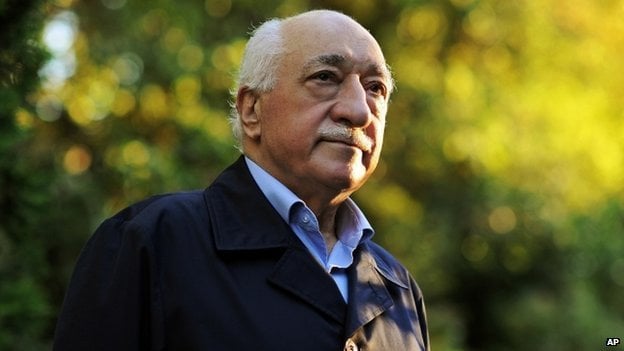
Fethullah Gulen, Turkish cleric exiled in the U.S. Since allegations of corruption by the government surfaced one year ago, Turkish President Recep Tayyip Erdogan has accused the opposition, under Gulen’s leadership, of trying to overthrow the government. Many critics say Erdogan is taking any action can, legal or not, to hold onto power. Photo: AP via BBC
In April 2014 I touched on attempts to expose corruption among government leaders in Turkey. It is sad to hear that this struggle continues, and those in power are taking increasingly aggressive measures to stay there.
Recep Tayyip Erdogan — formerly prime minister, now president — has maintained that the allegations of bribery and money laundering baseless attempts to create a “parallel state” and topple the government. Erdogan places blame for the supposed subversion squarely on cleric Fethullah Gulen, a former government supporter-turned-critic currently living in exile in the United States.
In the year since the corruption scandal surfaced in December 2013, the government has moved to silence its critics by firing or reassigning judges and prosecutors though to be in league with Gulen. The latest government “offensive” took place 2 weeks ago, mid-December 2014, when Turkish police arrested over 20 journalists, media executives, police and other opposition sympathizers, accusing them of fomenting terrorism. A warrant was even issued for Gulen himself, though this is viewed as symbolic- BBC’s Mark Lowen said that while Turkey and the U.S. have an extradition agreement, it is unlikely to be enforced in this case.
Erdogan also seems unmoved by international criticism of the recent crackdown. After an EU police official remarked that the December arrests go “against the European values and standards Turkey aspires to be part of,” Erdogan responded bluntly, “The EU should mind its own business.”
In Turkey, and a concernedly large number of other countries, in 2014 we continued to see the lengths entrenched power-holders will go to in order to stifle challenges (whether military, political or ideological in nature) to their rule. It is impossible for democracy to take root in such an environment.
An alliance with Turkey may yet be vital in the fight against ISIS, yet this should not deter the U.S. and others from insisting it get its own house in order. Ensuring stable democracies in Turkey and other countries in the region is crucial to the stability of the region as a whole.